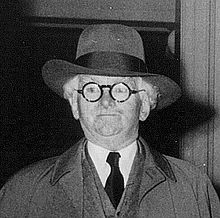Edward Crump
Edward Hull Crump (born October 2, 1874 in Holly Springs , Marshall County , Mississippi , † October 16, 1954 in Memphis , Tennessee ) was an American businessman and politician . Although he was never governor of Tennessee, he determined the affairs of this state for decades with the help of his economic power .
Live and act
Born and raised in Holly Springs, Mississippi, he moved to Memphis in 1892 and became a successful businessman. He started selling insurance and quickly made a name for himself in town. He held several offices in the city and was also sent several times to the Democratic National Convention . In 1910 he was elected mayor of Memphis. At the beginning of this decade he began to build a clientele with the help of his contacts that had an impact on the whole of Tennessee. He used Tennessee's two minority groups, blacks and Republicans , to keep his influence high. So he supported the blacks and secured their votes; Likewise, the Republicans found it necessary to bond with Crump in order to achieve their goals, since they were outnumbered and could only get things done with Crump's help. In this way, Crump influenced Tennessee politics for nearly half a century. He brought governors to power, and when they went against his interests he brought them down again, like Harry Hill McAlister , who, as governor of Tennessee , wanted to introduce sales tax and not abolish prohibition . Crump saw his interests at risk and brought Gordon Browning to power in the 1936 election . For most of the time, except for his time as mayor from 1910 to 1915, Crump pulled the strings from the background. It was not until 1930 that he stood up for the election to the US House of Representatives and won it. From 1931 to 1935 he was a Tennessee Democratic MP in Congress . In 1940 he was once again Mayor of Memphis.
End of power
Crump's influence began to wane in the late 1940s when two of his opponents won the elections: one was his former ally Gordon Browning, who had fallen out with Crump and defeated Crump's protégé Jim Nance McCord in his second term ; also Senator Estes Kefauver , who pursued a policy that was directed against private rulers like Crump. For the rest of his life, Crump's power was confined to Memphis. Another turning point was the electoral defeat of his longtime protégé Kenneth McKellar to Albert Gore Sr. in the 1952 Senate election. Crump died two years later and was buried in Memphis' Elmwood Cemetery .
Effects
Crump's effect on the city of Memphis can still be seen today. He strongly supported the fire brigade , which for many years was one of the best in the country and is still highly regarded. He believed that separate management of the city corporations was inefficient. Today, the Memphis Division of Light, Gas, & Water is one of the largest providers of municipal services in the United States. Noise protection was also on his agenda, the city received one of the strictest noise protection regulations. He was one of the early proponents of an automobile safety inspection. All vehicles registered in Memphis must be inspected annually.
Honors
In the city of Memphis, Crump Stadium and Crump Boulevard are named after him.
literature
- G. Wayne Dowdy Mayor Crump Don't Like It: Machine Politics in Memphis University Press of Mississippi: Jackson 2006; ISBN 9781604731132
Web links
- Edward Crump in the Biographical Directory of the United States Congress (English)
- Biography of Edward Crump (English)
| personal data | |
|---|---|
| SURNAME | Crump, Edward |
| ALTERNATIVE NAMES | Crump, Edward Hull (full name) |
| BRIEF DESCRIPTION | American entrepreneur and politician |
| DATE OF BIRTH | October 2, 1874 |
| PLACE OF BIRTH | Holly Springs , Mississippi |
| DATE OF DEATH | October 16, 1954 |
| Place of death | Memphis , Tennessee |



